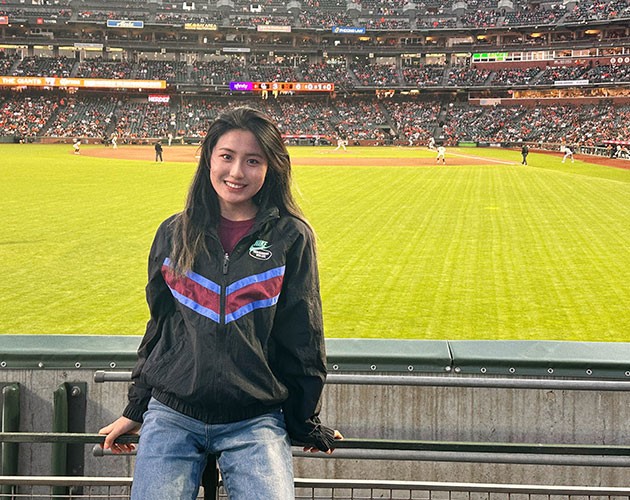Meet Berkeley Haas Global Access Program Graduate Iris Yuning

After attending an information session about our Berkeley Haas Global Access Program (BHGAP) at her home university of University-Beijing Foreign Studies University, Iris Yuning knew she wanted to gain more than the traditional four-year college experience.
She also wanted to further explore her career interests and gain hands-on experience. So Iris decided to take a gap year between her junior year and senior year. The result was Iris studying with us for a full academic year and becoming eligible to apply for Optional Practical Training (OPT)—making both goals a reality.
Studying in the Fall of 2018 and Spring 2019 semester, this BHGAP alumni says the program provided her with both career choices and life goal exploration.
We are very grateful that she reached out to us to share her story.
Read on to learn more about Iris’ experiences.
What brought you to BHGAP?
As a business student, I always believed practice matters more than pure theories. I wanted to explore the practical part of business, which was lacking in my home university teaching. I also wanted to experience the culture and life in the U.S. BHGAP offered a good opportunity for me to explore my options and figure out my interest.
You took quite a few courses, such as Fundamentals of Design Thinking, High Technology Marketing, Innovation Strategies for Emerging Technologies and Database Management. How did they fit in with your major?
The courses helped me have a taste of the fields not only in business, but also outside that field. For example, in the Database Management elective course from the School of Information, I learned that information is an interdisciplinary field that incorporates business, database and software engineering. The in-class connection with students and professors soon went beyond that. I was able to hear their stories in the information industry. I was also able to connect with information executives coming into the classroom. All the explorations then served as assets in figuring out my longer-term career choices.
How are your Berkeley classes different from or similar to your home institution?
Classes in Berkeley share similar course structures with my home institution, and they cover topics from basic to complicated. They also offer similar tracks for students to follow based on their interests, such as marketing, accounting, financial engineering or financial marketing.
But there are several differences. There are far more case studies in Berkeley than my home institution. Case studies are real-world simulations. Even for students with limited to no industry experience, they are able to gain full context of business from case studies. The content is also more updated, incorporating new changes and trends over the years. The classroom teaching emphasizes engagement, including a lot of discussions. Students are motivated to think out loud and express their ideas.
I think career coaching is especially essential for students at the early stage of their studies because it leads them into the business world with the guidance on how it works.
Did you participate in the career coaching opportunity?
Yes, every single student has a 1-1 career coaching session with the career development team. I had my career coaching with Heidi Weller, and I am still in contact with her. We have had lots of great conversations and she helped me gain a good understanding of important concepts, such as networking, coffee chats and brand build-up. I think career coaching is especially essential for students at the early stage of their studies because it leads them into the business world with the guidance on how it works. It is like “Career 101.”
But above all the coaching and resources, self drive plays the most important role of all. Learning means nothing without application. I definitely learned much more through proactively reaching out to make connections, learning from their experiences and being candid in asking questions.
What experiences did you have outside of the classroom? Any highlights?
Yes! The two biggest highlights were site visits and volunteering.
One of the site visits was to Berkeley Skydeck, the high-tech entrepreneurship startup accelerator and incubator program at the University of California. I was impressed by one of the company's AI-driven products during the site visit. Luckily enough, I was connected to the founder of Predictim (that AI startup) by Greg La Blanc. By immersing myself in the SkyDeck startup environment, I took a wide range of responsibilities from marketing to venture capital to product development. I secured the pre-seed round funding and was part of the company at the SkyDeck bi-annual demo day.
After Predictim, I joined another AI startup working on medical transcribing services. DeepScribe is now in Series B funding stage with more than $3 million valuation. It was from the above explorations that I realized my strengths and figured out my field in product management.
As a Christian, I made life-long friends in the Christian community. Aside from all the professional and school work, I spent the majority of my time in community engagement. I had been the project lead of Prisoners Literature Project since the summer of 2018. Post-release prisoners suffer from obstacles in getting back to society, such as securing jobs and having low self-esteem. I had been an information bootcamp developer and led teaching of their data analytics skills, which helped more than 10 prisoners secure jobs in the field. WIth all the involvement, I witnessed my passion in working with marginalized people and groups.
About your OPT experience. Where did you work, what were you doing and how did your BHGAP classes help you with OPT? What lessons did you learn during OPT?
I decided to take a gap year for OPT in the first semester of my junior year. The question of “What is the field that I am 100-percent passionate about” has always been lingering in my mind. And I took that gap year with the intent of understanding my career strengths and passions.
I interned at Matson, a supply chain and logistics company, in the finance department. I had been rotating among five teams within the finance function: financial forecasting, financial accounting, risk management, accounting and tax. It has been such a learning journey, working on the projects that lead to annual decisions and presenting my findings to the executive team. I can see what I learnt from BHGAP classes shadowing every single moment of my work—from financial analytics to communication among teams.
Working is never an individual matter, it is all about collaboration. My biggest learning—except for figuring out my career path—has been having the goals in mind first and then translating them into the language that stakeholders can understand. Communication is mutual. Only when the other side understands does communication work.
What’s next for you?
I am pursuing my master’s degree in Information Science at the University of Michigan. My career passion lies in product development and system optimization. I am still involved with the Prisoner Literature Project and will continue to do so.
Having benefited from the exploration during my time in BHGAP, I am still highly involved in marginalized groups. I help nonprofits with digital transformation, such as search engine optimization. It is super-rewarding to apply my skill sets into their needs. It ranges from improving algorithm efficiency to user research. This is also what I want to keep up with after I graduate.
What are your top 5 things to do in Berkeley and San Francisco?
1. Go to Sweetheart Cafe and grab a strawberry smoothie and popcorn chicken. I went there so often that I became friends with the owner!
2. Chill at the Memorial Glade.
3. Have lunch with friends at Jasmine Thai to the north of campus.
4. Hang out with friends at Sliver Pizzeria.
5. Visit Willard Park and have a barbecue with friends.
What advice would you give to someone who is starting BHGAP?
Don’t assume! You will meet so many people from a variety of backgrounds, both geographically and academically. Make the most of this diversity: Talk with them and learn from each other.
Making mistakes is not scary but keeping making the same mistakes is scary. The best lesson I learned from BHGAP—which I am still keeping reminding myself daily—is failure is the only path to success. Fail as many times, note them down and do it all over again.
Enjoy the nice weather and food in Berkeley!


